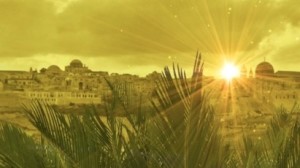When he drew near to Bethphage and Bethany, at the mount that is called Olivet, he sent two of his disciples, saying, “Go into the village in front of you, where on entering you will find a colt tied, on which no one has ever sat. Untie it and bring it here . . .” Luke 19:29-30
After leaving Jericho, they traveled on to Bethany and may have spent the Sabbath with Lazarus and his sisters. The “great crowd” of followers–how many now? One or two hundred?–must have overwhelmed the little town, but everyone sensed that the movement was about to come into its own. Jerusalem was next, and something great would take place there—something fixed, definite, and game-changing.
As the sun went down on another Sabbath, he called two of the twelve to him. Which two? Shall we pick? Let’s say it was Simon the Zealot and . . . Judas Iscariot.
They often don‘t get along because of political differences, Judas being a straightlaced, by-the-book sort, while Simon is always popping off about Roman occupiers and the Day of the Lord, meanwhile quoting blood-curdling passages from Nahum. But both are eagerly anticipating the kingdom, and equally thrilled to receive this commission.
As the Master explains the plan to borrow a donkey and enter Jerusalem in style, the disciples nod, glancing at each other with mutual comprehension. When they depart, the news spreads throughout the ranks of followers, just now waking up in pastures and barns: He means to ride into the city! He has never ridden anywhere, on anything! What could it mean, except that he’s about to claim his kingdom? A prancing stallion might have made the point better, perhaps, but little villages don’t often offer that kind of conveyance. No matter; if that’s what he intends to do, they’ll help him do it right.

At daybreak they are on the road, the sun opening up behind them like a benevolent hand. Spring breezes play with the new barley sprouting up in the fields and birdsong threads the excitable air. As they approach the rise known as the Mount of Olives, here come Judas and Simon, leading a little donkey with a gentle, placid face. “Master!” they shout. “It happened just as you told us. As we were untying the colt, its owner came out of the inn nearby and asked what we were doing and we said . . .”
He does not appear to be listening as he places a hand on the donkey’s head and gazes into its dark eyes. A look of understanding passes between them. Without any urging the beast moves closer. Peter whips off his coat and spreads it across the animal’s spine; three of the others follow suit. The donkey bends its hind legs and Jesus sits on its back, rising slightly over the heads of the surrounding men when the donkey straightens and staggers a little under the unaccustomed weight.
A gasp runs through the onlookers, and then a shout: “Hosanna! He comes! Blessed is he!”
Several of them run ahead to spread the news: “Clear the road! Jesus of Nazareth is coming!” The road is already thick with Passover traffic, but the travelers have heard of Jesus of Nazareth. Who hasn’t? They stop and move to the side, craning their necks to see—including a delegation of Pharisees outfitted in prayer shawls and phylacteries.
Young date palms sway along the road. One of the messengers shimmies up a trunk and cuts some branches, throwing them down to the women below. Soon bystanders are stripping leaves from other trees and the air fills with a sweet, dusty scent.
As the donkey carrying Messiah crests the hill, this is what they see: a landscape of heaving palm branches and fluttering headscarves, a waiting throng clustered along the way to the Holy City with the road laid bare as a bone. More people are running from the fields and pastures and the city itself, using their elbows to carve out places to stand and watch. The disciples can’t help grinning like holy fools—This is their moment!
One man strips off his cloak—his best, tight-woven and dyed russet red—and lays it down before the blessed beast. Soon the road is patched with them—coats and cloaks and bright sashes, pressed into the ground by careful hooves. Random cries are beginning to coalesce in a single repeated shout:
“Hosanna! Blessed is the one who comes in the name of the Lord!”
It’s a customary shout for festive worshippers entering the temple or gathering palms for the Festival of Booths. That feast, also known as Ingathering, normally comes in the fall, but they’re celebrating the Ingathering early this year, and why not? The LORD always said he would gather his people and open the holy gates for them:
Lift up your heads, O gates!
And be lifted up, O ancient doors,
That the King of Glory may come in!
The delegation of Pharisees sticks out like disapproving schoolmasters. “Teacher!” one of them calls to the passing procession: “Tell your disciples to pipe down! This is Passover, not Succoth.”
The disciples can’t help feeling smug as their teacher answers, calling back over his shoulder, “I might as well tell these stones to pipe down!”
And there before them, at long last, is the Holy City, where all their hopes and dreams will come true.
________________________________________________


















